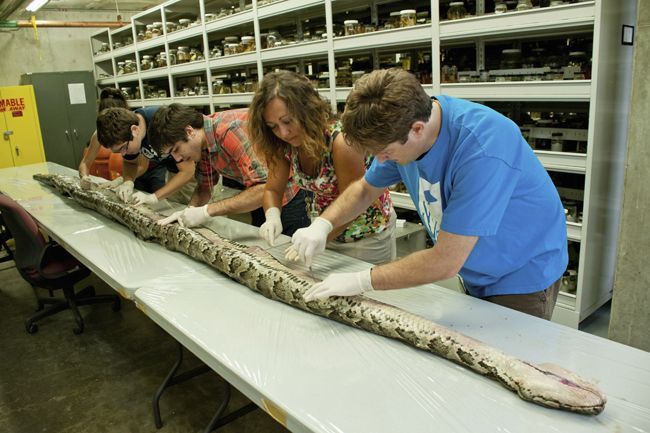
Florida's pythons are on the loose. Now, we know what you're thinking; but this isn't the set up to a joke just so you can reply, "Not all of 'em!" while flexing and grinning. It's a formal challenge from the state's wildlife commission to kill you a damn python, you sissy. That's why they call it "The Python Challenge," not "The Python Suggestion."
Florida wildlife officials issued the invitation to hunt in an attempt to control the population of Burmese pythons. Florida announced the southern portion of the state is currently overrun with the gargantuan snakes, which have become an especially invasive species in the wetlands.
On Jan. 12 Florida will begin its month-long open bounty contest on hunting the giant snakes. The contest will be split into two distinct brackets: one for the general public and another for state-licensed python hunters who are allowed to enter special wildlife areas, according to the Florida Sun-Sentinel. Winners in both divisions will receive $1,000 for catching the longest serpent and $1,500 for catching the greatest number of the snakes.
Contestants from the general public must be registered through the contest website.
Contestants are allowed to hunt pythons only in the state's Everglades, Big Cypress, Holey Land, and Rotenberger Wildlife Management Areas.
According to Florida Fish and Wildlife Conservation Commission spokesperson Carli Segelson, the goal of the contest is both "eradication and documentation," ABCnews.com reported.
"Our goal is to help get rid of the python from the wild, educate the public about the snake's impact on the Florida ecosystem, and inform them of what impacts non-native pets can have if allowed into the wild," Segelson said.
Burmese pythons are among the largest snakes in the world. In their native South Asia range, the non-venomous python can measure up to 26 feet. The longest ever specimen ever found in Florida measured 17 feet, according to ABC News.
While the reptile's enormous size might strike fear your heart alone, there's never been a documented Burmese python attack on a human in the Florida wild, according to Segelson. She says the breeding populations are generally spread out, found in sparsely populated areas.
"The problem is with animals ..." Segelson explained, "the pythons eat native birds, reptiles, and small mammals, many of which are threatened species."
Aside from registration for the contest, the Florida wildlife commission's website offers safety training, rules and guidelines, and tips on how to identify Burmese pythons.
The site also offers a list of ways to safely kill the snakes once they are found, such as using a machete to decapitate the snake, or using a gun.
"Whichever method they use, hunters have an ethical obligation to dispatch the snake as humanely as possible," Segelson said.
After a contestant makes a kill, the official sites asks hunters to deliver specimens to official drop-off sites no longer than 24 hours after "harvesting." At that point, researchers will gather data from the python, "including size and location where it was found, which they hope to use to better understand the biology of the Florida invaders," reported ABC News.
After the snakes are inspected and their measurements are recorded, they'll be returned to hunters who can choose to preserve the snake or its skin.
One Florida company, All American Gator, says it will buy the longest snakeskins from hunter participating in the challenge.
"We intend to do all that with the python skins," owner Brian Wood told ABCnews.com. "People will use salt to preserve the snakes and then sell them to us. We'll pay anywhere from $50 to $100. That's for snakes eight feet long and up."
Florida currently prohibits possession or sale of Burmese pythons for use as pets, and federal law bans the importation and interstate sale of the species.
The challenge will culminate with an official awards ceremony Feb. 16 at Zoo Miami.
According to Segelson, the contest has already attracted plenty of media attention, and she's looking forward to big turnout.
"We only started getting the word out this past Wednesday," Segelson said, "and we already have people registering. There was a lot of interest in Burmese pythons before and it is no surprise that people are so interested."
© 2025 Latin Times. All rights reserved. Do not reproduce without permission.




